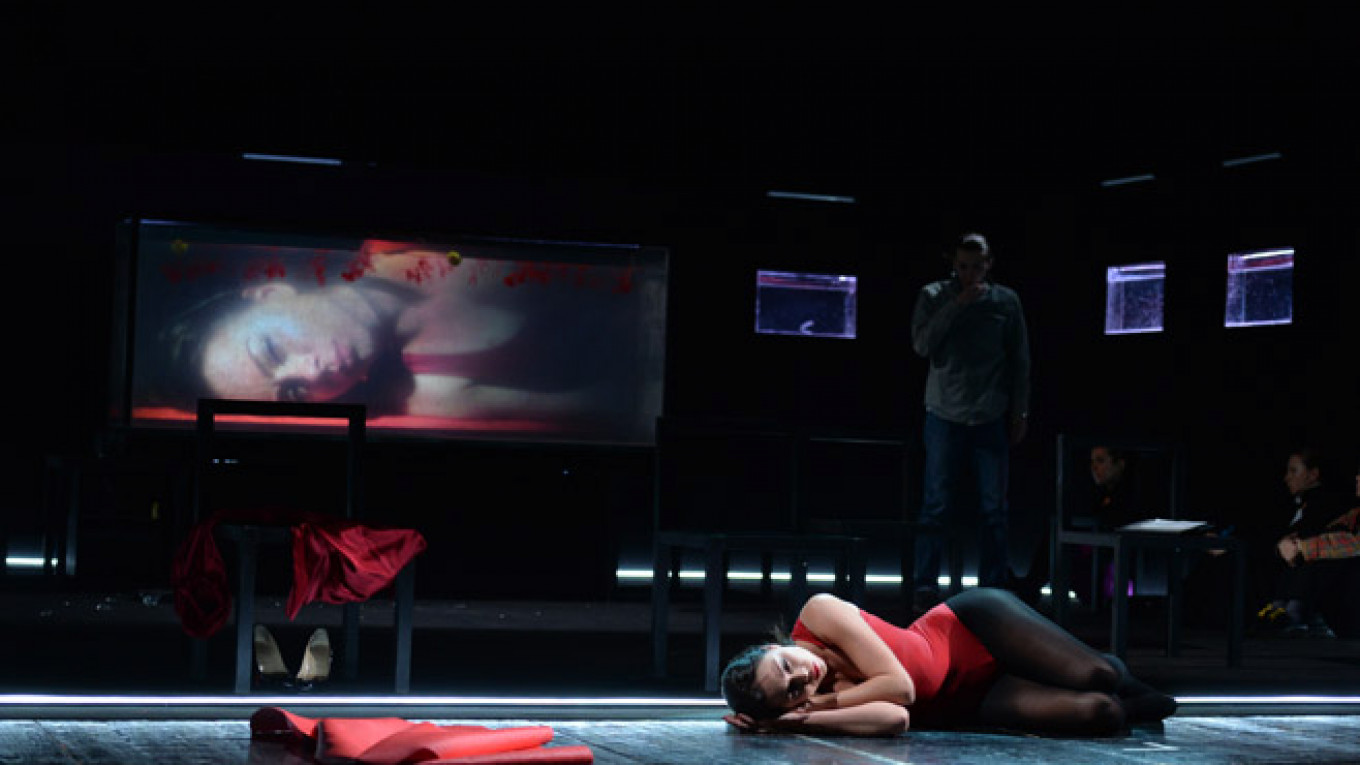A little over 13 years ago an often violent and seemingly coarse play called "Plasticine" — written by Vasily Sigarev — burst onto the scene and gave contemporary drama a huge shot in the arm. Suddenly everyone was talking about the "uncouth" Sigarev and his young, soon-to-be streetwise anti-heroes.
That place in time is where you want to look if you're in search of the moment in recent Russian theater history when plays with conventional literary qualities were pretty much pushed overboard and left behind to drown.
I'm compelled to recall this occasion because of the premiere at Theater Na Maloi Bronnoi of a new play called "Formalin" by the well-known Russian novelist Anatoly Korolyov. I'm stretching it, but in the mere similarity of the titles ("Plasticine" is "Plastilin" in Russian), I am encouraged to see something of a throwback, or a mirror image. But if Sigarev fired one of the first major shots at our understanding of drama as a traditional literary form, Korolyov has come along to return it with a vengeance.
It's not that the main character in "Formalin" is a writer trying to get to the bottom of a mystery that unfolds before our eyes. Many non-traditional writers use that device.
The difference is the way Korolyov unfolds the text and, therefore, the action on stage. This is the structure of a master novelist, a writer who is accustomed to working out complex puzzles of character and plot over hundreds of pages. Throughout the performance of "Formalin" I had the strange sensation I was "watching" literature. It was as if the author opened up his creative method and let the audience in to see how he creates intrigue and interest by messing with truth and fallacy.
It is a move that is fraught with dangers.
For the novelist, obscurity is a great weapon — it keeps a reader intrigued and engaged. It is more perilous for a playwright. Theater is a crude art, the limitations are enormous. Attempts to be too sophisticated run the risk of slipping right past the spectator unrecognized. And, in Sergei Golomazov's staging of "Formalin," obscurity reigns supreme.
Designer Nikolai Simonov puts us in an enigmatic environment centered on something like a huge aquarium — or a container of formaldehyde, another name for formalin — in which oceans roil, clouds churn, X-rays pulse and human shadows pass. The stage is ringed by apertures that may be windows or television or computer monitors. It's all dark and perplexing.
In principle, we witness a court trial in which a host of individuals seek to understand why an old man's dog was shot, and why the old man retaliated by kidnapping the neighbor's boy.
Most insistent on seeking the truth is the Writer (Dmitry Serdyuk). However, the Judge (Nadezhda Berebenya), the Prosecutor (Dmitry Tsursky) and two attorneys (Alla Ivantsova and Taisiya Ruchkovskaya) also seek to legitimize their versions of what happened.
Rather like Akira Kurosawa's seminal film "Roshomon," in which various characters narrate divergent interpretations of a murder, but bring us no closer to an understanding of what really happened, "Formalin" constantly offers up new information about the shooting and kidnapping that overturns or undermines previous accounts.
Korolyov goes further, however. He gives each character a trance-like opportunity to step back into childhood and recall some small, though significant incident involving a dog that for each character is bound up in the notion of love, affection, or their absence or loss. It is a sleight of hand that turns the attention of the play away from crimes, depositions, interrogations and accusations to human emotions.
The boy's father (Ivan Shabaltas), who probably killed the old man's dog, reveals a childhood humiliation that made him hate dogs forever. The boy's mother (Nastasya Samburskaya), after the trauma of losing her son for a year, now denies any kinship with her former self. Paradoxically, we learn that the boy was probably never loved as well as he was when held hostage by the old man.
In this production "Formalin" can be dauntingly inaccessible. But it's interesting to see Anatoly Korolyov boldly move to bring literature back to drama.
"Formalin" plays Thursday and Dec. 26, Jan. 22 and 30 at 7 p.m. at the Theater Na Maloi Bronnoi, located at 4 Malaya Bronnaya Ulitsa. Metro Pushkinskaya. 495-690-5953. mbronnaya.theatre.ru. Running time: 2 hours, 15 minutes.
Contact the author at artsreporter@imedia.ru


